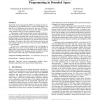1174 search results - page 182 / 235 » A Logical Approach to Abstract Algebra |
ICSOC
2010
Springer
13 years 8 months ago
2010
Springer
In Service-Oriented Computing (SOC), fragmentation and merging of workflows are motivated by a number of concerns, among which we can cite design issues, performance, and privacy. ...
EUSFLAT
2009
13 years 7 months ago
2009
The age at which we teach different topics change. If it turns out that students do not learn, say, reading by the time they should, a natural idea is to start teaching them earlie...
POPL
2012
ACM
12 years 5 months ago
2012
ACM
Functional reactive programming (FRP) is an elegant and successful approach to programming reactive systems declaratively. The high levels of abstraction and expressivity that mak...
CAV
2012
Springer
12 years 12 days ago
2012
Springer
Abstract. A minimum satisfying assignment of a formula is a minimumcost partial assignment of values to the variables in the formula that guarantees the formula is true. Minimum sa...
MIDDLEWARE
2007
Springer
14 years 4 months ago
2007
Springer
This paper is about a novel rule-based approach for reasoning about qualitative spatiotemporal relations among technology-rich autonomous objects, to which we refer to as artifact...

